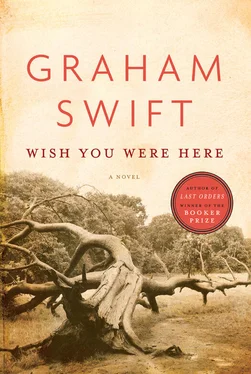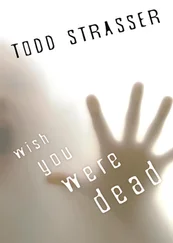But, sadly, he was not unused to the thing itself, no longer even surprised by it. The underlying causes were fairly obvious — look around. He was both glad and a little guilty to be a policeman, drawing his steady policeman’s pay, while farmers all around him were going under. He should really have been like some odd man out within the community — though a policeman, a sort of outlaw — a stay-at-home version of Tom Luxton joining the army. Yet now his services were peculiarly called upon. He’d known that the Luxton farm, especially after Tom had withdrawn his labour, was near the limit. None of it was surprising, and the best thing was to clear it up as tidily as possible.
Had he been told when he became a policeman that he’d one day be officiating over all the wretched consequences of a so-called mad-cow disease, he’d have said that such an idea was itself mad. He hadn’t supposed — though he hadn’t sought a quiet life and there was such a thing as rural crime — that he’d become one day a sort of superintendent of misery. He’d never be (nor would DS Hunt, he reckoned) any other sort of superintendent.
And all this was years before the foot-and-mouth (by which time he was, at least, a sergeant). More dead cattle — great crackling heaps of them. And a few more deaths among the ‘farming fraternity’. Was it Jack Luxton who’d once passed on to him that phrase?
Poor men. Poor beasts. Both.
Michael crossed the yard and, skirting the Small Barn where the pick-up and the Land Rover and the spreader were housed, entered Barton Field by the top gate. Barton Field, only six acres and a roughly shaped strip of land, buckling and widening as it descended, was the nearest field to the farmhouse, its upper, narrow end meeting the shelf in the hillside where the farm buildings stood. Its challenging contours made it the least manageable field at Jebb, but it was the ‘home’ field of the farm and formed its immediate prospect. At the top, at its steepest, it bulged prominently, turning, further down, into a gentler scoop, so that its flat lower end was hidden from even the upper windows of the farmhouse. But this only enhanced the view. From the house you looked, over the fall of the land, to the woods in the valley and to the hills beyond, but principally took in — perfectly placed between foreground and background — the broad top third or so of the big single oak that stood near the middle of the field where its slope levelled off. The oak’s massive trunk could not be seen, nor the immense, spreading roots which had risen above the surrounding soil. But between these roots, where the grass had given up, were small hollows of that reddish earth that Jack would notice on the last stages of a strange, westbound journey. The roots themselves were thick and ridged enough to form little ledges or seats, for a sheep or a man.
The oak was, of course, a great stealer of the surrounding pasture — its only value to provide shade for the livestock — but it was a magnificent tree. It had been there at least as long as Luxtons had owned the land. To have removed it would have been unthinkable (as well as a forbidding practical task). It simply went with the farm. No one taking in that view for the first time could have failed to see that the tree was the immovable, natural companion of the farmhouse, or, to put it another way, that so long as the tree stood, so must the farmhouse. And no mere idle visitor — especially if they came from a city and saw that tree on a summer’s day — could have avoided the simpler thought that it was a perfect spot for a picnic.
None of these thoughts had particularly occurred to Michael or to Jack (or, when he was there, to Tom). They were so used to the tree straddling their view that they could, for most of the time, not really notice it. Nonetheless, it was straight to this tree that Michael walked on an icy November night, carrying a gun. Or as straight as the steep slope allowed.
Exact evidence of his path was left by the tracks in the frost that Jack, only a little later, picked up by the light of his torch. At one spot it was clear that his father had slipped and slid for a yard or more on his arse. It was very strange for Jack to think of this minor mishap at such a moment — of his father perhaps swearing under his breath at it and suffering its jolting indignity. As it was strange to think that this slip might not have been a simple slip at all, given that his father was carrying at the time a possibly already loaded and closed gun. There might have been a much nastier accident.
Had the frost not begun to melt — unlike the previous morning — even before daybreak, it would have left a very clear record of the activity in Barton Field that night: Michael’s tracks, with that slip, going in one direction, and Jack’s going, separately, in both directions (and, despite the great agitation he was in, without a single slip). But all of them converging on the oak tree.
In his statements Jack had voluntarily made the point that when he’d spotted his father’s tracks he’d both followed and avoided them, even carefully skirting round the broad mark where the slip had occurred. He had instinctively not walked through them, not out of forensic considerations, but because, as he failed really to convey clearly but as his listeners may have grasped, they were the last footsteps his father had taken.
Of course, this meant that the descending pair of tracks might have given the appearance that the two men had walked down together. There was certainly only one set of ascending tracks. But all this was neither here nor there, since by dawn and even by the time Jack made his phone call — he’d delayed the call because of the state he was in, but also because he knew not much could practicably be done while it was still dark — a change in the weather occurred. A breeze got up, bringing in cloud cover, and the air warmed appreciably.
By the time the two policemen arrived and descended the field with Jack — who was clearly dreading what he would have to see in daylight — the sharp night had turned into a grey, gusty morning. The top branches of the oak tree made a continual whirring above them, and dislodged leaves spun down. The frost had gone. There was even a touch of drizzle. So the policemen perhaps wondered why Jack had needed to speak about the tracks he’d seen by torchlight that were no longer there — unless, of course, it was simply because he couldn’t help reliving, and reliving again, every detail. Both officers were not unused to this. It was strange how the silent ones could suddenly become the gushers, while the regular gabblers could lose their voices.
But what both officers had mostly thought was: What must it have been like, to shine a torch on that ?
The frost was there, anyway, when Jack first walked down, and would have sufficiently reflected the moonlight to make the torch barely necessary. The dark mass of the oak tree, against the ghostly silver of the field and the woods beyond, would have been visible of itself, Jack knew, to his father, who’d carried no torch. Perhaps his father had calculated even this, had waited for the moon to rise and light him. He would have been able to take a final look around. He would have been able, when it came to things closer to hand, to make out the roots under the tree and the gun he was holding: its dull metal glint and his own fingers on it.
Michael sat down at the foot of the oak. There was a sort of bowl in one of the thickest roots, close up to the trunk, which was ideal for this. He took his donkey jacket off first, despite the cold, the better perhaps to manipulate the gun, but also to spread under him before he sat. This precaution was as strange as it was natural: he’d wanted to spare his arse, already damp maybe, from any chilly hardness. It was like that extra blanket on the bed, though Jack didn’t say this. Nor did Jack express to anyone his private view that his father would have removed his jacket so as to be better able to feel, through his remaining layers, the wrinkled bark and supporting, towering, centuries-old solidity of the tree against his back.
Читать дальше








![Питер Джеймс - Wish You Were Dead [story]](/books/430350/piter-dzhejms-wish-you-were-dead-story-thumb.webp)



